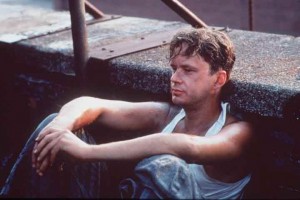Because I’m feeling quote happy these days I’ll bludgeon you over the head again with a relatable quip–
“Get busy living, or get busy dying.”
The movie buffs amongst you will recognize those as the words of Andy Dufresne, the hopeful, wrongfully imprisoned banker in The Shawshank Redemption. It’s fair to say that Syria has taken these words to heart, and gotten busy.

Andy would be proud of Syrian efforts of late
It has been obvious to many for some time that Syria is in serious need of an overhaul. Either crumbling, or all together non-existant, Syrian infrastructure is one of the main constraints holding the country back. Roads, bridges, ports and other means of transportation lag far behind the needs of the growing population. Electrical production, water capacity, refuse collection and disposal, and sewage treatment, range from mildly insufficient to woefully inadequate. Access to the basic services many take for granted can be cruelly distributed based on wealth and personal privilege.
While this is still largely true, much is afoot in Syria’s fair capitol.
One instance of efforts to address the transportation side of the infrastructure issue, which was covered in these digital pages, is the new Kefer Soussah square project. Well, Kefer Soussah hasn’t been the only site to get a face lift recently. Bab Touma, long an ill managed and chaotic jumble has just received a large scale renovation, which includes the addition of many new parking spaces, improved and enlarged roads, and a newly open green space. Improvements to the southern bypass road on the Damascus-Homs highway, especially the new Jeramana bridge, have also made rush hour traffic slightly more tolerable.
Big news also comes from the telecommunications sector. Last month the Syrian government announced that 6 companies had made bids for the third national mobile phone license. While some have their doubts about claims of governmental non-interference and transparency, the process have progressed more or less according to plan. It will be interesting to watch the licensure proceedings move forward as they will undoubtedly serve as a signal to foreign investors as to the general willingness of the regime to work with outside partners. Plenty of ink (digital and otherwise) has been spilled extolling the intent of the Syrian government to make Syria a safe place to invest. It remains to be seen how genuine those intentions are.
Potentially even more influential, the creation of the Regional Cable Network (RCN) was announced today. Plans call for over 7ooo km of fibre optic cable to be laid, originating in the UAE and culminating in Turkey, which would connect Syria and other regional partners with Europe. With over $5oo million in total investment, the project would dramatically improve Syrian telecommunications capacity. If the project lives up to expectations it would represent a dramatic leap forward for a nation often characterized as electronically repressive.
These developments also come within the context of many aggressive strategic partnerships, most notably between Syria and Turkey. This week has marked the second meeting of the Turkey-Syria High-Level Strategic Cooperation Council. The two countries announced several high profile agreements to come out of the council meeting. Amongst the projects slated to be initiated in 2011 were several banking ventures, a stated goal of doubling bilateral trade to $5 bn, and the creation of several joint infrastructure projects–a cross border high speed train and jointly constructed damn to name two–aimed at further linking the neighboring countries.
I am still skeptical as to what exactly the regime is hoping to achieve by way of these efforts. As with the Kefer Soussah square project, I wonder if genuine problem solving is the true motivating factor at play. A rosy analysis would say yes, things are changing for the better. A less optimistic assessment would see the potential for ulterior motives in such endeavors.
Nonetheless, getting busy is an understatement.